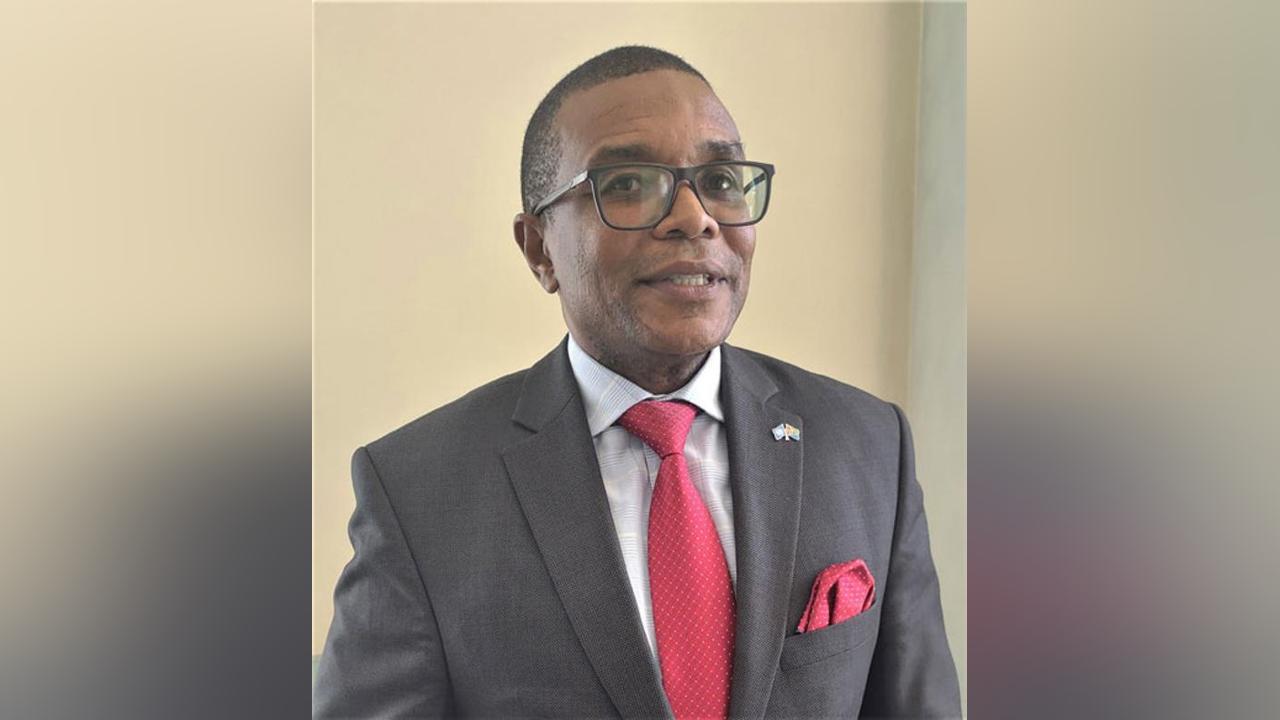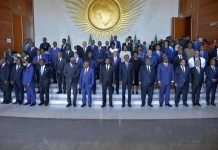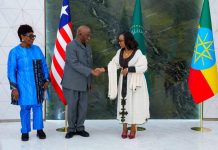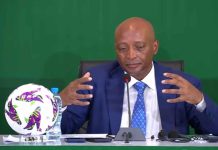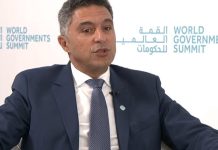Africa-Press – Eritrea. Our guest today, Mr. James Wakiaga, UNDP representative to Eritrea, discusses before his departure the economic and social aspects of development that he witnessed during his four-year stay in Eritrea.
***
Thank you so much for having me. I would like to take this opportunity to convey warm greetings and congratulations to the people of Eritrea as you mark Independence Day on the 24th of May. I think many are familiar with the works of UNDP. I have been in the country for the past four years, and so this has been quite a journey. I have been carrying out the works of UNDP just like those who were before me in promoting sustainable development in Eritrea. We have covered quite a lot of ground and the work we’ve been doing touches on many important sectors of the economy.
It’s been a very interesting and revealing journey taking into account that we’ve been working on areas prioritized by the government. For example, UNDP has been accompanying the government in the areas of sustainable management of resources, specifically looking at nature-based solutions to adapt [to deal with] climate change, looking around the works of soil conservation, as well as working closely with the cross-segment in the area of capacity development at institutional level and systems. We have seen tremendous progress that has been achieved in the area of the human development index.
If you look across the board, even in areas that are critical for the country’s investment such as energy, where we see energy transition as a catalyzer of sustainable development, UNDP has been a partner with the government. One good example is that we worked with the government, together with the European Union, on the Mai-dima Areza project which I had an occasion to visit. It had a transformational impact on the community as the beneficiary, on the economy, and on health and education.
When I arrived in 2019, I needed to understand the Eritrean model of development. So I quickly learned the national philosophy in terms of the development approach which is self-reliance. That has been a critical factor in how we as UNDP can find entry points to further engage and support the national development priorities. I would really love to thank Eritrea for providing those platforms and those spaces for us to be able to engage and accompany the government.
There have been aspects that are critical in the area of youth and skills development which is an important project. Here, we’ve been working with NUEYS (National Union of Eritrean Youth and Students) to advance skills development across the country in different youth centers. The area of the energy transition, as I mentioned earlier, has been one area that we look for to further advance in terms of moving forward and delivering critical important development results for the country. So, I think there is a whole range of areas where I still see we have an opportunity.
I had an opportunity to visit Massawa and saw the whole potential of promoting tourism and promoting the marine industry. I see this as another area that can catalyze development, particularly in the area of the blue economy. There is also the date palms, and this is another area that the Ministry of Agriculture is pursuing and investing in, and as UNDP we are happy about our partnership to support the growth of the dead palm in the Red Sea region. This can open up job opportunities and we’ll witness more women’s engagement as well. But what’s most important is seeing Eritrea become one of the nine exporters of dates globally.
I must say that Eritrea is on the right track in terms of its development trajectory. We are looking at investment in the human capital because it is critical in supporting the country’s development process. In the area of education, we have seen an increase in enrollments, and we’ve witnessed how Eritrea has been performing in the area of health. As you know, Eritrea is among the first countries that achieved health indicators under the MDG paradigm, and, therefore, it’s building on these in the context of sustainable development goals.
In terms of human capital, I see a huge opportunity for improving and building on education in terms of quality and in terms of skills development in areas that will be critical in powering the country’s development. Secondly, I look at the area of food security, and Eritrea, again, has a good track record. The investments that the Ministry of Agriculture is making by going beyond food security to achieve its trajectory in areas of food nutrition are critical, particularly for children. Diversification in terms of production in the area of agriculture by shifting towards value chain systems is an area in which the Ministry of Agriculture is working with other partners the UN is already looking into. Another important resource is water where the government has been increasingly making a lot of investments over the years in providing clean water to citizens in rural as well as urban areas.
I’m proud to have the opportunity to work in Eritrea. Eritrea’s journey is something that I deliberately looked forward to being part of as it is one of the youngest countries to gain its independence. Eritrea is a young proud nation and it offers a lot of lessons to other countries in terms of its credentials in pan-Africanism and in terms of its development approach, the philosophy of self-reliance. I think this is a paradigm that offers vital lessons on how you rely on your own resources to sustain your own development. This is a vital lesson I carry with me. And I’m looking at the ambition of the country. The ambition is to be a country that is peaceful and able to create job opportunities for its young population, and able to provide the basic necessities to each and every Eritrean. I think this is an aspiration for all countries, and this is part of what we call the SDG agenda.
One of the key drivers of change that I see is agriculture, not just for Eritrea but for the continent as a whole. It will be important in food security and the provision of the necessary material for the manufacturing sector, particularly that of the value chain system.
Another area is tourism and heritage. I’m always proud of Eritrea’s heritage in terms of the fact that it was able to conserve the culture and maintain the beauty of Asmara as one of UNESCO heritages. It’s a huge attraction.
The other area I see is innovation. I must say I have been in contact with a lot of youth in the country and I get amazed with their knowledge and their level of understanding of areas such as digitalization. And so as UNDP, we’ve been working closely with the National Union of Eritrean Youth and Students to look, for example, at how we can develop the capacity of the innovation lab that is under establishment.
Then, of course, the fact that the country has invested a lot in soil conservation and afforestation is a key driver of change. Those projects are something to be proud of because of their transformative nature in soil conservation, land security, and diversification of crops. A lot of the initiatives that are being taken in the country are people-centered, which is critical, and it aligns with the UNDP mantra of ensuring that nobody is left behind.
It was good to travel and I had the opportunity to travel to different parts of the nation and interact with the community. One thing that always struck me is the solidarity of the community and the role of the community in driving the development agenda in those areas. I saw that community has always been central and it aligns with our African tradition where we have to view everything from the lenses of the community. And the warm welcomes I received to share coffee and injera and the generosity were truly impressive. The landscapes and the mountains that I saw during every trip are also amazing attractions the country offers. Also, the sandy beach of Massawa with its clean water and amazing fisheries is something to be proud of.
What I have witnessed in the past four years is the deepening of the partnership between the Government of the State of Eritrea and the UN. The hallmark of this was of course the recent signing of the cooperation framework that run from 2022 to 2024, which accentuates the confidence and trust between the government and the UNDP. My role as a UNDP representative over the years has been to cultivate the confidence and trust to achieve their ambition in the area of development through dialogues with the government and the people. This has been the mantra of the UN in terms of ensuring that we build that trust and we accompany the government in fostering its development agenda. Eritrea is part of the UN family and that’s why we tend not to be prescriptive but rather to look at what it is that the government wants to do to promote its development ideas. We are happy that we have a very strong relationship. And I must once again thank the government for providing that space and that platform. I’m sure we will continue to sustain moving into the future and look forward to further support because, at the end of the day, we all share a common future, which is to ensure we have improved livelihoods.
We are here to share ideas in terms of what we see as viable policy choices and options in an open-minded way. We are also here to learn what Eritrea is doing well so that we can share it with other countries. I see a lot of opportunities that are being presented to Eritrea in a number of areas where Eritrea can be a leader — energy transition, infrastructure, mineral resources, and more.
Thank you!
For More News And Analysis About Eritrea Follow Africa-Press


